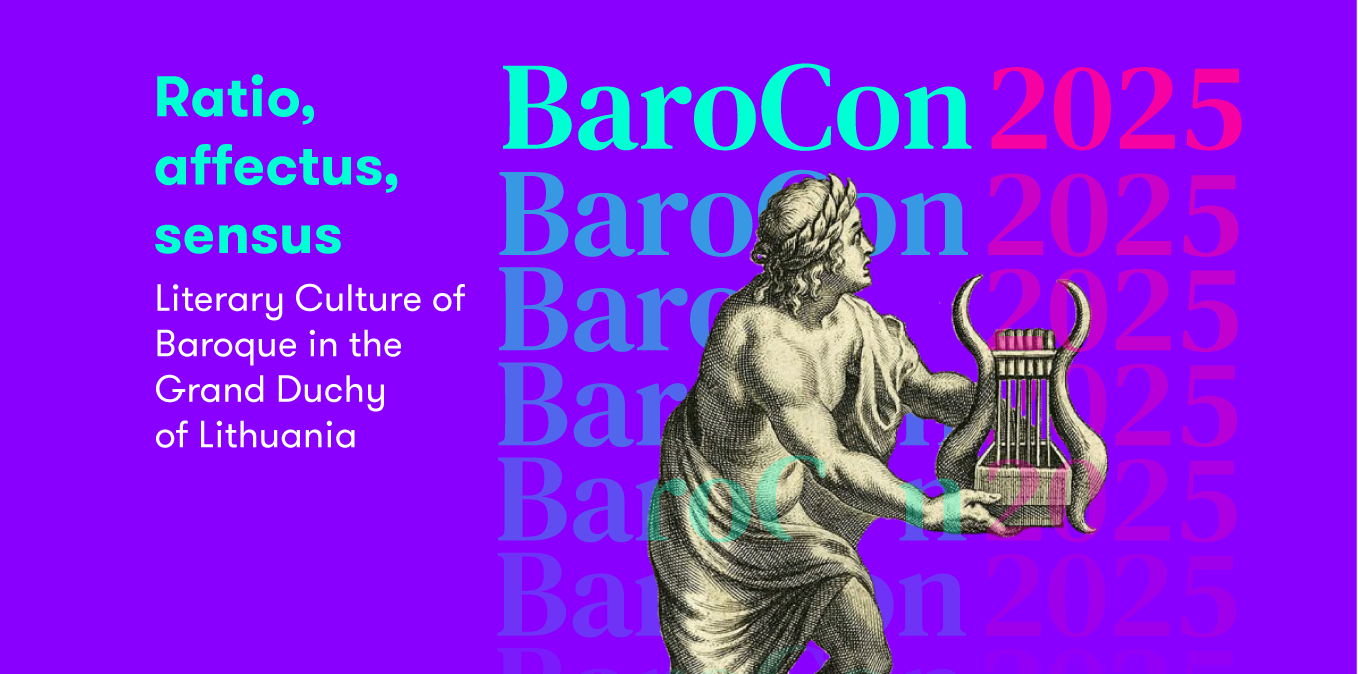Ratio, affectus, sensus: Literary Culture of the Baroque in the Grand Duchy of Lithuania
In 2025, we will commemorate the 400th anniversary of the first publication of Matheus Casimirus Sarbievius' most famous Latin poetry collection 'Lyricorum libri tres' (1625). This has led to 2025 being declared the Year of Baroque Literature in Lithuania. The eminent Jesuit neo-Latin poet of the Polish-Lithuanian Commonwealth, Sarbievius, has been hailed as the Christian Horace and the Sarmatian Horace. His theoretical thoughts on poetry and rhetoric are still highly regarded and have inspired new research on other concurrent themes and authors. This anniversary provides an opportunity to explore the extent and diversity of Baroque literary culture, which has seen a surge of interest in recent decades, both in the academic world and in popular culture. Therefore, the Institute of Lithuanian Literature and Folklore, together with the Faculty of Philology of Vilnius University, is organising an international academic conference "Ratio, affectus, sensus: Literary Culture of the Baroque in the Grand Duchy of Lithuania" on 25-27 September 2025 in the baroque city of Vilnius.
The aim of the multidisciplinary conference is to stimulate discussion on the literary culture of the "long seventeenth century" (from the end of the 16th century to the middle of the 18th century) in the Grand Duchy of Lithuania. This historical period, associated with dramatic changes and a general cultural crisis, is often described in contradictory terms and in constant tension between reason and senses, rigid structure and passions, classifications and impressions, etc. By embracing this contradiction, we invite an exploration of the theme in question through the lens of this dynamic interplay between reason (ratio), emotion (affectus) and the senses (sensus), which can be perceived in various genres of the period, such as poetry, biography, hagiography, rhetoric, private and public correspondence, and so on. The importance of the modern approach lies not only in what it can reveal about the Baroque in the Grand Duchy of Lithuania, but also about subsequent and contemporary literary culture, as scholars have demonstrated the continuing influence of a 'Baroque spirit'.
Event location
25–26 September the conference will take place at V. Krėvė (118) auditorium, Faculty of Philology
27 September the conference will take place at the Church Heritage Museum, Šv. Mykolo g. 9 (entrance from Maironio g. "Arkangelo konferencijų centras")
Keynote speakers

Ona Dilytė-Čiurinskienė
Senior Researcher, The Institute of Lithuanian Literature and Folklore
Prof Stephen Harrison
Professor of Latin literature, University of Oxford
Aistė Kučinskienė
Baroque Literature and Sarbievijus in Lithuanian Schools: From Neglect to Prosperity
Aistė Kučinskienė
Vilnius University
Baroque Literature and Sarbievijus in Lithuanian Schools: From Neglect to Prosperity
Keywords: Lithuanian school curricula, literary canon, reception of Baroque literature, Sarbievijus
The literary history taught in schools both reflects and shapes the cultural values of a particular society, contributing to the formation of collective cultural narratives (John Guillory). In contemporary Lithuania, school curricula, textbooks, and other educational materials emphasize the Baroque period as a remarkable era, highlighting the Vilnius Baroque school and the works of the great Baroque genius Motiejus Kazimieras Sarbievijus, among others. The 21st century’s curricula and textbooks present Lithuanian Baroque as “the most prolific cultural period of the Grand Duchy of Lithuania”. However, the reception of Lithuania’s Baroque literature in both scholarly and educational contexts was significantly reshaped over the last decades, compared to its earlier reception. During the interwar period, Lithuanian literary canon taught in schools was constructed around its “Lithuanianness” and nation’s spirit. As a result, Baroque literature, written in other languages, was largely neglected (Sarbievijus appeared in only one textbook in 1932). Lithuania’s Baroque literature was also marginalized during the Soviet era, as neither the Baroque worldview nor Sarbievijus’s poetry aligned with Soviet ideology. The revival of Baroque literature in educational materials began in the 1990s, partly due to the 400th anniversary of Sarbievijus in 1995. This shift was also influenced by the concept of multilingual national literature, which began to gain importance during this period but was completely overshadowed by the ethnolinguistic notion of Lithuanian literature throughout the 20th century. In this paper, using the approach of descriptive canon research, I will examine the reasons behind the neglect of Baroque literature throughout the 20th century and the factors that contributed to its prosperity in contemporary Lithuanian schools. I will also explore the recent increase in the canonicity of Sarbievijus, linking these changes in the literary canon to shifts in collective cultural narratives.


